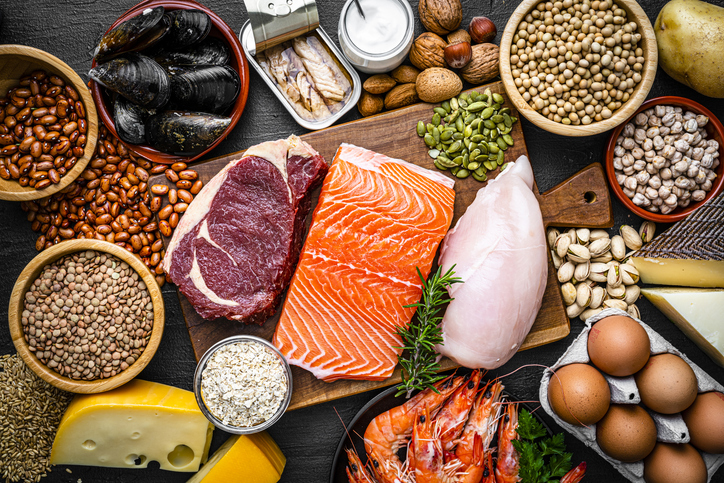August 13, 2022
Have you ever noticed that the quality and quantity of food you eat impacts your mood? Do some foods leave you feeling foggy, tired, bloated, achy, or a little down? If so—it’s not all in your head! Your brain is an organ, just like your heart or liver, and it can be affected by inflammation, nutrient deficiencies, and the foods you eat. Food, mood, and brain chemistry is an emerging science that is clearly demonstrating the impact food has on energy, motivation, and mood. While continued research is needed, here are a few basic steps that can start your journey to feeling better fast.
When discussing food and mood, there are 3 main pillars that are necessary to consider which include:
- Foods that lower inflammation
- Foods that balance blood sugars
- Foods that optimize gut health and your microbiome
The 7 nutritional steps to take to optimize energy, mood and brain health include:
7 Steps to improve your mood with food
Step 1 – Eat protein with every meal – Protein stabilizes blood sugars and reduces hunger. Ideal proteins include organic fish, chicken, turkey, grass fed beef, eggs, yogurt, tofu, beans and collagen. Eating protein regularly has also been linked to higher levels of dopamine and norepinephrine, which are brain chemicals that play a role in mood, motivation and concentration.
Step 2 – Eat colorful fruits and vegetables at every meal – Fruits and vegetables contain very powerful plant chemical and polyphenols that lower the inflammatory response, keep blood sugars balanced and are ideal for gut biome. When selecting the type of fruit or vegetable you want to eat, the more variety the better. The American Gut project showed that individuals that eat more than 30 different types of plants per week had the best gut health. For example- opt for mixed berries instead of just blueberries.
Step 3 – Break up with added sugar and refined flours – In addition to being pro-inflammatory and contributing to the overgrowth of candida in the gut, refined flours and added sugars also bounce blood sugars leaving you feeling low energy, foggy and craving for more. To help stabilize your energy and avoid “crashes” during the day – eliminate all added sugars and replace with natural sugars such as fruit (berries, apples, melons etc.). You can also sweeten your baked goods with monk fruit sugar – a zero calorie, zero carbohydrate option that can be used 1:1 with regular sugar. I put a small amount of either monk fruit sugar or maple syrup into my daughter’s morning smoothies. For my favorite type of monk fruit sugar, click here. For gut health, I also add in 1 small scoop of GI revive.
Step 4 – Eliminate food irritants – If you are sensitive to certain foods food – it can create a cascade of inflammation and cause gut disruption which can impact mood and energy. Of all foods, hands down the most common food irritants are gluten and dairy. I often eliminate gluten and dairy strictly from my client’s diet for a 4-6 week period and monitor symptoms.
Why eliminate both gluten and dairy? Casein, the protein found in dairy, is very structurally similar to gliadin, the protein in gluten. When your body reacts to gluten, there’s a good chance it can also react to dairy because of this protein so both need to go at first. When you are ready to re-introduce the foods, do so on a “trial” basis to see how you feel. For some (like me!) – dairy and gluten are just not something I can tolerate.
Step 5 – Eat omega 3 rich foods – Omega 3 fats have many beneficial effects on the body such as lowering blood pressure, helping with depression and anxiety, improving both eye health and brain health and reducing symptoms of ADHD in children. Omega 3s are also anti-inflammatory making them beneficial for those suffering from auto immune disease.
You can find high levels of omega 3 in oily fish (salmon, mackerel, seabass, oysters), flaxseeds, chia seeds, walnuts, firm tofu and edamame. You can also supplement with a distilled daily fish oil to ensure you are getting enough. Make sure your fish oil supplement is from a distilled such as NutraSea. NutraSea is a great choice (in liquid or capsules) for an ultra-pure and balanced omega-3 supplement. With 1250 mg of EPA+DHA per serving, NutraSea helps support the maintenance of good health.
Step 6 – Hydrate like crazy – To optimize gut health and to lower inflammation -proper hydration is essential. According to the Journal of the American College of Nutrition, even just 2% dehydration takes a toll on brain function. In fact, a recent study showed that those who drank water prior to performing a cognitive test had a 14% increased reaction time when compared to those who did not drink water. In addition to their decreased cognitive performance, those who were dehydrated reported being more confused and tense than those who drank water. How much is enough? On average – try for 2 liters per day!
Step 7 -Consider adrenal support– Your adrenal glands are two triangular shaped glands that sit at the top of your kidneys and secrete hormones in your body. Chronic stress can put a high demand on the adrenals and tax them to the point of exhaustion. This can create an excess secretion of cortisol (your stress hormone), causing excess fat storage, difficult weight loss, fatigue, brain fog and muscle aches. To download my free cortisol solution guide, click here.
If you are looking to take the next step to optimal health and wellness, book in for a free health and weight loss assessment or check out all of my online courses here!




